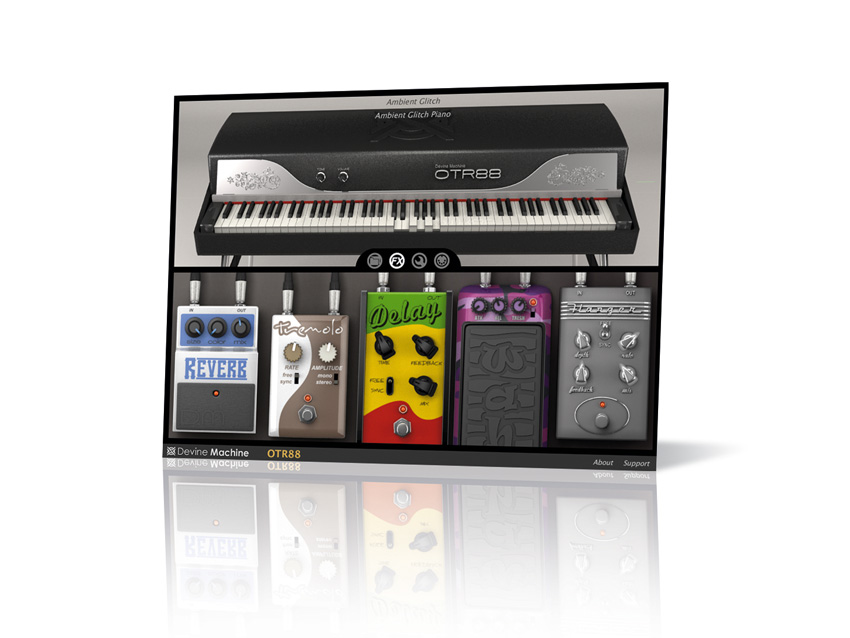MusicRadar Verdict
OTR88 brings something different to the virtual EP market and will delight control freaks and tone nuts alike.
Pros
- +
Sounds great and is very playable. Lovely interface. More flexible than many of its rivals. Per-key parameter settings.
Cons
- -
Heavy on your CPU.
MusicRadar's got your back
The first software-based electric pianos - like Emagic's EVP88 and AAS' Lounge Lizard - were based not on samples, but on real-time tone generation methods.
They were pretty well received, but that didn't stop the likes of Native Instruments and, more recently, MOTU from producing similarly-themed instruments (Elektrik Piano and Electric Keys respectively) that rely on samples of vintage hardware.
OTR88 brings things full circle, physically modelling its sounds. It's also obsessed with detail, enabling you to adjust 17 parameters for all or, more unusually, each of the 88 notes.
However, OTR88 is something of a CPU hog. There are no specific requirements for non-Intel Macs, but we had trouble using it on a G5 dual 1.8GHz with 1.25GB RAM - it ran standalone, but not as a plug-in in GarageBand.
Luckily, our Intel Core 2 Duo 2.66GHz PC with 3GB of RAM coped fine, and Devine Machine says that it's working on G5 optimisations for a future update.
In use
Once up and running, we immediately found OTR88 to be an excellent instrument. You're greeted by the Main view, which puts an electric piano graphic at the top and the stompbox effects currently in use at the bottom (choose up to five from Chorus, Delay, Distortion, Flanger, Phaser, Reverb, Tremolo and Wah).
Sounds can be loaded and saved in the Preset Manager, which is organised into lists of Global (with effects) or plain Piano presets. It should be noted that preset load times are super-quick - an obvious advantage of not using samples.
Want all the hottest music and gear news, reviews, deals, features and more, direct to your inbox? Sign up here.
Other views include the MIDI page, which enables you to easily assign parameters to your controller hardware and adjust the polyphony, velocity curve, pitchbend range and MIDI channel, plus the Advanced Settings window.
Devine Machine is rightly proud of this, which it describes as the core of the instrument.
Although the Advanced Settings window looks rather intimidating, some clever interface design means that editing the 17 available parameters is actually very simple.
These fall into two categories - Tine settings and Hammer & Damper settings - and are listed in the upper display. This enables adjustment of all parameters for the selected note, which can be selected in the lower panel.
This graph-like lower display enables you to adjust the parameter you've selected in the upper display for each note, or you can click the Move All button to adjust the parameter for all notes simultaneously.
It sounds complicated, but once you get stuck in, the system becomes obvious, plus it makes creating pianos fun and intuitive. Other options are to interpolate parameters and smoothen/randomise the graph.
Summary
For OTR88 to justify its existence, it would have to offer something that its rivals don't, and it succeeds in several ways.
Firstly, there's the presentation: this is by some distance the slickest virtual electric piano on the market. Its ease of use is made all the more impressive when you consider just how in-depth you can go with your editing - if you want maximum control, this is the electric piano for you.
And crucially, the OTR88's sounds are tremendous. The Rhodes and Wurly-inspired presets are instantly playable, and there's a depth to them that's almost unmatched. Start editing the patches and you come to realise that all the parameters really do make a palpable difference to the tone - the only danger is that you'll end up obsessing too much!
The non standard presets are also excellent, for OTR88 is capable of more than straight emulations. What's more, the effects feel fully integrated, rather than simply bolted on.
This is far more than just another virtual EP - in fact, it feels decidedly next-gen. Whether you simply want to play the supplied presets or take the time to build your own, OTR88 shines.
Listen to a selection of OTR88's presets
Mk1 73 Dry
Wurli Hard Dry
I'll Be There
Still Crazy
Computer Music magazine is the world’s best selling publication dedicated solely to making great music with your Mac or PC computer. Each issue it brings its lucky readers the best in cutting-edge tutorials, need-to-know, expert software reviews and even all the tools you actually need to make great music today, courtesy of our legendary CM Plugin Suite.

